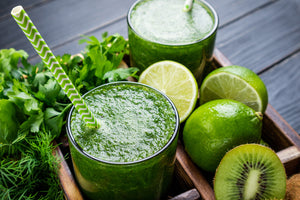Hibiscus - Kidney Support and Beyond

Hibiscus is an herbaceous plant well known for its showy, brightly colored blossoms that not only are beautiful, but also contain an array of health benefits. Gardeners may strategically use these flowers to attract birds, bees and other insects, while Hawaiian and Tahitian women are known to adorn their hair with hibiscus blossoms. If worn over the right ear the flower marks that the woman is single, but if worn over the left ear the flower declares that she is taken!
There are hundreds of varieties of the hibiscus flower native to temperate, subtropical and tropical areas of the world. Certain species have been chosen as the national flowers of Malaysia, South Korea and Haiti, and as the state flower of Hawaii. In India, the red hibiscus flower represents the Hindu goddess Kali, appearing intertwined with the image of the goddess herself.
Despite the colorful, cultural history of hibiscus flowers, the chemical compounds residing within their beautiful petals are far more attractive to those seeking health and wellness. Among all of the varieties, Hibiscus sabdariffa (otherwise known as Roselle) is the dominating species in the world of health. The compounds housed within the flowers consist of a hearty dose of healthy acids and protective antioxidants. These beneficial components are most often delivered in the form of tea. A quick look at the ingredient lists of many common herbal tea concoctions will prove the popularity of this herbaceous plant. Due to the presence of a chemical component known as anthocyanin, hibiscus will turn any beverage a colorful pink or red, making it a common choice for brightly colored iced tea during the summer.
In the world of health advocacy, anthocyanins and other naturally occurring compounds known as polyphenols, are of great interest because of their ability to act as antioxidants and support a healthy cardiovascular system. These antioxidants, housed within red hibiscus flowers, have been shown to protect healthy cholesterol from the damaging effects of free radicals. LDL cholesterol is a target for free radicals; once it has been destroyed by the free radicals, it is able to more efficiently “stick” to vessel walls and contribute to plaque development. As plaque builds up, blood pressure begins to soar. By protecting LDL cholesterol from the damaging free radicals, the antioxidants found in hibiscus may support healthy blood pressure and a healthy cardiovascular system.
The antioxidants found in hibiscus not only support a healthy heart, but also protect other important organs of the body. For instance, free radicals can be harmful to the kidneys; however, some studies found that the antioxidants in hibiscus were helpful in restoring and supporting damaged kidneys.
Speaking of kidneys, hibiscus appears to be a good friend to the entire urinary tract. Many individuals are plagued with various harmful organisms that like to make the urinary tract their home. Whether fungus or bacteria, these critters are responsible for urinary tract infections that cause burning, itching and painful symptoms. Interestingly, the compounds found in hibiscus create an environment in the urinary tract that is not so friendly toward invaders. Therefore, hibiscus can help protect the urinary tract from infection, and support this system when it is under attack by microorganisms. Unfriendly yeast presents a particularly challenging situation since few pharmaceutical drugs are available to treat it; however, hibiscus can assist the body in fighting these fungal infections in order to help restore a healthy urinary tract. The helpful compounds found in hibiscus are also found in cranberries, which are often touted as a helpful food for maintaining healthy urinary tracts.
So, the next time you find yourself reaching for a cup of tea, whether steaming hot or ice cold, consider relaxing with a cup of hibiscus. Not only will the extra dose of antioxidants help keep your cells strong and healthy, but your kidneys and urinary tract will also thank you for the health benefits this wonderful herb provides.
- David Brady







Comments 0